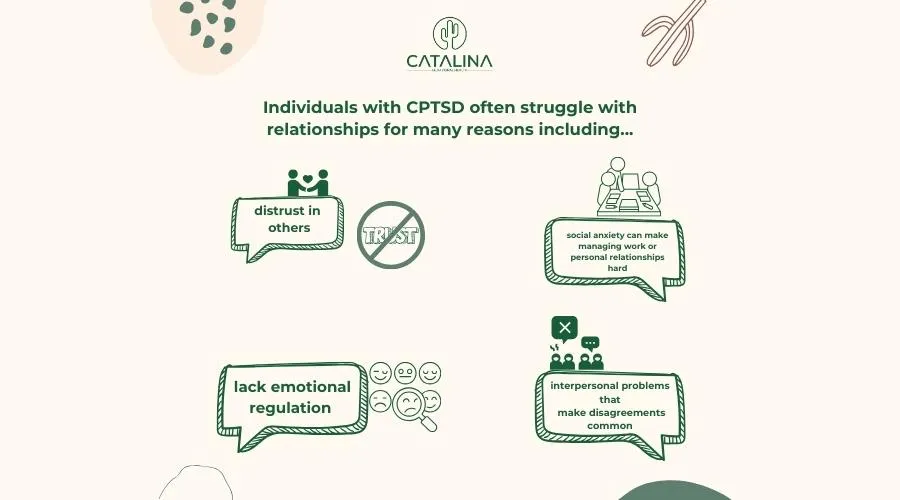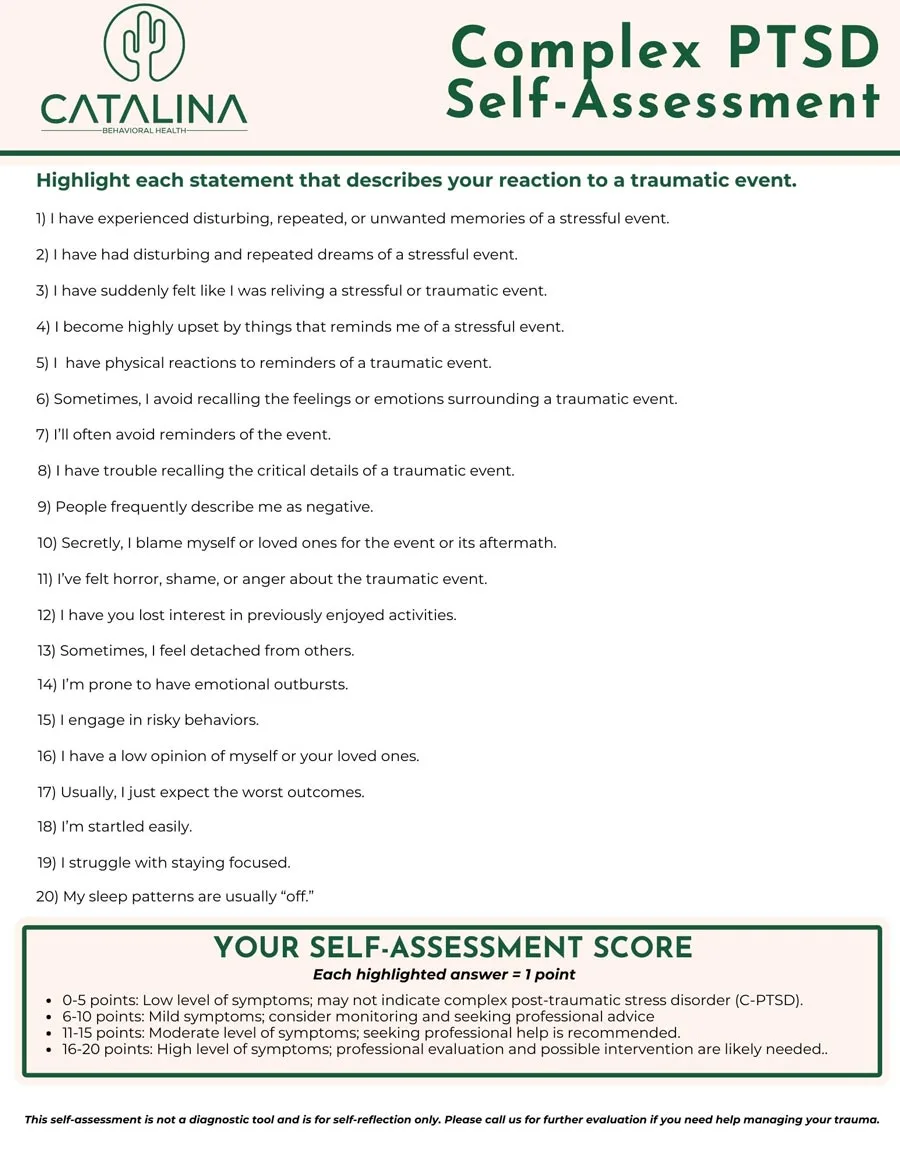Identifying the Signs of Complex PTSD Easily
Congratulations! By seeking information about Complex PTSD, you’re taking a first step in understanding this mental health condition. Recognizing the signs and symptoms is essential to receive proper care and support.
You are not alone in your journey.
The World Health Organization (WHO) and the American Psychiatric Association (APA) agree. Post-traumatic stress disorder (PTSD) disrupts lives. So seeking complex PTSD treatment is fundamental to healing. Catalina Behavioral Health helps individuals resolve mental health challenges.
If you are struggling with CPTSD, we can help! Keep reading to learn more about diagnosing Complex PTSD and how to get effective support at our center for you or a loved one.
24 Hour Mental Health Rehab Helpline
What Is Complex Post-Traumatic Stress Disorder?
Complex Post Traumatic Stress Disorder (C-PTSD) is a recognized diagnosis. It is in the Diagnostic and Statistical Manual (DSM). The DSM defines Traumatic Stress Disorder CPTSD as a unique form of Post-Traumatic Stress Disorder or PTSD.
It arises from repeated or prolonged exposure to traumatic events and can evolve into Post Traumatic Stress Syndrome or PTSS in some cases. It does not stem from a single traumatic incident. Accurate diagnosis is essential for healing. A diagnosis informs the appropriate course of treatment and support.
While not provided in person, our informal complex PTSD quiz offers a look at the most typical symptoms and can serve as a valuable initial form of a, ‘Do I have PTSD?’ test.
The Primary Causes of Complex Post Traumatic Stress Disorder

Complex Post Traumatic Stress Disorder, CPTSD, develops from repeated traumatic memories, multiple traumas, or chronic trauma. Often these arise from childhood trauma events, and then are blended with traumatic events suffered as an adult.
Our childhood trauma test provides a look at whether such experiences may have been impactful in your life.
These events increase the risk factors for traumatic stress disorder PTSD:
- Childhood trauma occurs during early life. It can impact a person’s emotional and mental well-being. Childhood trauma is a common cause of stress and post-traumatic stress disorder.
- Sexual abuse has severe emotional distress and long-term psychological consequences. These can contribute to other mental disorders. Sexual abuse often relates to domestic violence.
- Substance abuse, including drugs or alcohol, can worsen existing trauma. They also increase the chances of a new traumatic experience that may cause one to develop PTSD. Continued use can hinder healing, worsen other mental disorders, and cause negative emotions to arise.
- Exposure to violence, like witnessing or involvement in violence, is harmful. These can include domestic violence or a random attack. Either can significantly impact a person significantly.
- Natural disaster, like a hurricane, flood, or earthquake, causes extreme loss, stress, and fear. The sudden and unpredictable event can cause disassociation as a coping mechanism. The trauma’s so overwhelming that disassociation makes them feel disconnected from the event. But that avoidance worsens it.
- Physical abuse or harm (by a loved one or a stranger) leads to feelings of powerlessness and fear. The emotional fallout increases the likelihood of a serious mental health condition later.
- Emotional abuse, harmful manipulation, or verbal attacks can cause psychological damage. Repeated trauma over a long period worsens its impact.
- Neglect, physical or emotional, can make a person feel unloved and unworthy. It harms self-esteem and can cause one to self-harm to seek attention. It may also contribute to the development of C-PTSD.
- Chronic stress or repeated high-stress situations can lead to emotional exhaustion. It causes psychological harm in some.
- Car accidents, especially severe incidents, can cause both physical symptoms and psychological injuries. The sudden, unexpected traumatic stress of a car accident can cause significant impairment to the body and mind.
- Migration, particularly when it involves escaping dangerous situations, causes intense stress. It compounds when someone must adapt to a new culture.
- War or conflict exposes individuals to extreme trauma. It increases the likelihood of developing C-PTSD.
The underlying trauma varies, or people may have a combination based on previous trauma. These events can be one-time occurrences or repeated over time. But each can impact an individual’s mental health. Because of all the possible factors, psychological therapies vary to meet PTSD clients’ unique needs.
Traumatic Stress Disorder and Your Brain

Traumatic stress disorders like Complex PTSD can impact the brain’s function and structure. It harms memory processing, emotional regulation, and interpersonal connections.
Memory Function
Traumatic experiences can disrupt the brain’s ability to process and store memories. they lead to fragmented or disorganized recollections. This disruption can result in intrusive thoughts or flashbacks. During these, the individual relives the traumatic event.
Prefrontal Cortex
The prefrontal cortex handles decision-making and emotional regulation. Simply put, trauma harms it.
This damage may lead to difficulties in managing emotions and rational decisions. Thus, it complicates daily life and relationships.
Sustaining Relationships

Trauma-related changes in emotional regulation and trust hinder the brain. It reduces its ability to form and maintain connections. This makes it challenging for individuals to develop and maintain healthy relationships. Particularly in terms of CPTSD and romantic relationships, this can be frustrating and impact satisfaction with life and happiness.
The Impact of C-PTSD on Daily Life

Living with Complex PTSD can make daily life challenging due to the following:
- Difficulty maintaining relationships. Trust and emotional intimacy may be hard to establish. The person may struggle to form and maintain close bonds, especially if they have been a part of trauma bonding in a relationship previously.
- Extreme stress. The person may experience heightened stress levels. This response comes from situations that remind them of their trauma.
- Flashbacks. Vivid, intrusive memories of traumatic events can disrupt daily life and cause distress.
- Avoidance. People may avoid places, situations, or people that remind them of the trauma. This pattern can lead to social isolation or a restricted lifestyle.
These PTSD symptoms can make life seem overwhelming for someone living with C-PTSD. You can learn coping tools to reduce these impacts. Help is available.
Traditional PTSD vs Complex PTSD
Traditional PTSD (T-PTSD) and Complex PTSD stem from traumatic experiences. But there are critical differences between the two:
- T-PTSD arises from a single traumatic event. But C-PTSD results from repeated or prolonged exposure to trauma.
- C-PTSD has extra symptoms. They include difficulties with emotional regulation or feelings of shame or guilt. They also have frequent interpersonal problems.
- The treatment approaches for C-PTSD may differ from those for T-PTSD. That’s because of the complexities associated with repeated or prolonged trauma.
CPTSD Quiz: Complex PTSD Symptoms and Signs

The core symptoms of Complex PTSD include the following:
- Intrusive thoughts or memories are unwanted, involuntary thoughts. They enter a mind when someone least expects them, causing much distress. Someone with C-PTSD can quickly lose focus.
- Avoiding trauma-related stimuli refers to deliberately avoiding situations, places, people, or objects that remind the person of their traumatic experiences. This behavior is a coping mechanism to prevent the triggering of distressing emotions, memories, or physical reactions associated with the trauma.
- Negative alterations in mood and cognition, such as sadness, anger, guilt, or shame. These can often create a distorted perception of themselves or others. These alterations can lead to feelings of detachment, diminished interest in activities, or hopelessness.
- Alterations in arousal and reactivity may manifest as irritability, difficulty concentrating, hypervigilance, or heightened startle response. It can also result in sleep disturbances or reckless behavior.
- Somatic symptoms are physical manifestations of psychological distress, often experienced by individuals with C-PTSD. Examples include headaches, gastrointestinal issues, muscle tension, or chronic pain. Somatic symptoms can significantly impact a person’s quality of life and may indicate unresolved trauma.
- Emotional dysregulation can manifest as sudden mood swings, intense emotional outbursts, or difficulty calming down when upset. This emotional instability can strain interpersonal relationships and make it challenging for the person to navigate everyday situations.
Share these and additional symptoms with your doctors and the team at Catalina Behavioral Health. Honest conversation leads our medical professionals to diagnose and treat C-PTSD more effectively and help you overcome symptoms more quickly to find relief.
Get Immediate Help for Trauma Treatment
Similarities Between Complex PTSD and Borderline Personality Disorder
Complex PTSD and Borderline Personality Disorder (BPD) share overlapping features. These include emotional instability, interpersonal trauma, inherited personality traits, negative self-perception, and other persistent relationship difficulties.
They are distinct disorders with unique diagnostic criteria and treatment approaches. A licensed mental health professional will differentiate between the two to provide the most effective care.
Treating Complex PTSD and Repeated Trauma

Catalina Behavioral Health offers a range of psychological therapies for Complex PTSD. We offer the following:
Individual therapy
Talk therapy, an individual therapy, involves discussing traumatic experiences with a licensed counselor or therapist. It helps individuals process their emotions and develop coping strategies.
Group therapy
For those with C-PTSD, group therapy can provide a sense of connection and understanding, allowing them to process their trauma and develop coping strategies with the guidance of a trained therapist. Your peers become a strong support system as you learn from each other.
Trauma-focused cognitive-behavioral therapy (TF-CBT)
TF-CBT is a specialized form of cognitive-behavioral therapy. It addresses the unique needs of individuals with C-PTSD. This therapy helps individuals identify and change negative thoughts about their trauma. They also develop C-PTSD coping skills and improve emotional regulation.
Eye movement desensitization and reprocessing (EMDR)
Eye Movement Desensitization and Reprocessing (EMDR) helps individuals reprocess traumatic memories using coordinated eye movements to aid in reframing. It reduces the emotional impact that may cause mental illness.
Exposure therapy
Exposure therapy gradually exposes individuals to trauma-related stimuli in a controlled environment. It helps them confront and reduce their fear response.
Dialectical behavioral therapy (DBT)

This cognitive-behavioral therapy (CBT) subset known as DBT, takes a structured approach. Participants learn how to manage intense emotions and improve relationships with others.
Both CBT and DBT are evidence-based methods of behavioral modifications, but with somewhat different approaches and situations where they are best employed. CBT and DBT both support recovery from addiction and mental health concerns, but are best used for specific situations, which are decided by our treatment team on a case-by-case basis.
Somatic therapy
Somatic therapy focuses on how the body heals trauma. It helps people release physical tension and emotional pain from their bodies.
Participants learn deep breathing and holotropic breathwork, grounding exercises, and guided imagery. These help them reconnect with their bodies and process their trauma physically.
Cognitive processing therapy (CPT)
CPT is a specific type of cognitive-behavioral therapy. It helps individuals who have experienced complex trauma, like C-PTSD clients. CPT identifies the dysfunctional thoughts, beliefs, and emotions that stem from traumatic events.
Individuals with C-PTSD develop a more balanced and adaptive perspective on their traumatic experiences. It allows them to manage their symptoms and move forward in their healing process.
These treatment options address the underlying mental illness, develop coping skills, and improve post-traumatic stress disorder or PTSD.
Lifestyle Changes to Relieve the Stress of Living With C-PTSD

Several lifestyle changes help individuals recover from PTSD. These holistic therapies seek to make the whole person well again.
These activities restore the body and the mind, teaching positive lifestyle factors. Thus, they decrease the risk factors that trigger a person suffering from C-PTSD. They’re also helpful for other mental health conditions.
Long-term trauma does not appear overnight. It takes months or years to form persistent perceptions that cause self-harm, flashbacks, or C-PTSD symptoms.
These new behaviors help when recovering from damaging stress and additional symptoms associated with Complex PTSD:
- Regular exercise or physical activity can help reduce stress. It may also stabilize mood swings.
- Healthy eating. A balanced diet can support overall mental health and well-being.
- Adequate sleep. Prioritizing sleep can help reduce mood swings and heal.
- Mindfulness practices. Meditation, yoga, or other mindfulness techniques can help improve focus and reduce anxiety.
- Support networks. Building and maintaining connections with supportive friends and family gives valuable emotional support.
- Engaging with a therapist or counselor can guide individuals through these helpful coping strategies. Caregivers also give guidance on managing symptoms.
This Complex PTSD Test Can Assist in Accurate Diagnoses

Various online tools can help individuals self-assess for Complex PTSD. One tool is the PTSD Checklist for DSM-5 (PCL-5), available here.
The self-assessment asks people to reflect for thirty days and remember how much they have been bothered by events. They direct the test-takers to rate the complex post-traumatic stress disorder symptoms as follows:
- Not bothered at all
- Bothered a little bit
- Moderately
- Bothered quite a bit
- Extremely bothered
We summarize the questions below. But please refer to the test for the exact, complete questions:
- Disturbing, repeated, or unwanted memories of a stressful event?
- Disturbing and repeated dreams of a stressful event?
- Suddenly feeling like you are reliving a stressful or traumatic event?
- Becoming highly upset by something reminding you of a stressful event?
- Having a physical reaction to something that reminds you of a stressful event? These include a racing heart, sweating, and hyperventilating.
- Avoiding recalling the feelings or emotions surrounding a traumatic event?
- Avoidance of external reminders of a stressful event? These include conversations, people, places, or situations, among other factors.
- Trouble recalling the critical details of a traumatic event?
- Feeling highly negative about yourself, others, or world traumatic events?
- Blaming yourself or others involved for the stressful event or its aftermath?
- Experiencing negative feelings about the stressful event? These include horror, shame, anger, or blame.
- Lost interest in formerly enjoyable activities?
- Feeling detached from others?
- Difficulty feeling positive about yourself, family members, or others you love?
- Emotional outbursts of anger or aggression?
- Engaging in risky or harmful behaviors?
- Becoming hypervigilant, always expecting the worst?
- Startling easy?
- Finding it challenging to concentrate?
- Difficulty falling asleep or experiencing interrupted sleep patterns?
Be honest in these answers. Please share them with our Admissions team and doctors. Honesty can help you get the proper diagnosis and help.
It’s important to understand that online tests may not diagnose accurately. Asking yourself if you display these PTSD symptoms as part of our PTSD screening quiz is just the first step to seeking care.
Individuals may have a dual diagnosis or underlying issues that demand professional assessment. Self-diagnosis and self-medication can be harmful. So seeking help from an accredited mental health treatment center like Catalina is utterly essential.
Accredited Trauma and PTSD Programs
Get Support for Complex Post-Traumatic Stress Disorder Today
Remember, understanding and addressing Complex PTSD requires a comprehensive and empathetic approach. You are taking essential steps toward improving your mental health by seeking information and support.
The experienced team at Catalina Behavioral Health will support you at every step. We start by verifying insurance coverage so you can focus on self-care. We guide you through therapies and help you decide if you are a candidate for medication.
We stay at your side through aftercare and recovery services. We will help you resolve the complex trauma and heal.
Connect with us today. You can begin your journey toward a fresh start today!




